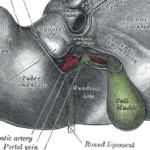1. Patients on fazirsiran had reductions in total liver misfolded alpha1-antitrypsin protein (Z-ATT).
2. All patients taking fazirsiran had histologic improvements in inflammation and biomarkers of liver injury.
Evidence Rating Level: 2 (Good)
Study Rundown: Alpha1-antitrypsin deficiency results in an accumulation of Z-ATT in hepatocytes. Further, high levels of Z-ATT can contribute to the progression of liver disease and fibrosis. Fazirsiran is a therapeutic agent which has been shown to degrade Z-ATT messenger RNA. Subsequently, reduced levels of Z-AAT protein synthesis have been recorded in hepatocytes. In the present study, Z-ATT levels were measured in a group of patients on fazirsiran. Patients were included who had a history of alpha1-antitrypsin deficiency and liver disease. All patients saw a reduction in total liver Z-ATT with fazirsiran treatment. A reduction in Z-ATT was associated with histologic improvements in inflammation and biomarkers of liver injury. Over the trial period of 1.5 years, no deaths were reported and no patients discontinued fazirsiran. The strength of this study was that numerous objective measures were recorded, such as both serum biomarkers and imaging studies for study endpoints. This may present an opportunity for prevention or regression of fibrosis in patients with alpha1-antitrypsin deficiency.
Click to read the study in NEJM
Relevant Reading: Alpha1-antitrypsin deficiency
In-Depth [prospective cohort]: This multicenter, phase two, open-label trial examined the efficacy of fazirsiran in patients with alpha1-antitrypsin deficiency and liver disease. Patients with cirrhosis were excluded from the study. Patients were sequentially entered into three cohorts that received varying doses of fazirsiran. Each patient received a liver-biopsy both at baseline and afterwards during follow-up. All patients saw a median reduction of percentage in accumulated total liver Z-AAT of -83.3% (95% Confidence Interval [CI], -89.7 to -76.4). After fazirsiran treatment, patients showed a decreased globule burden by 69%. Regression of fibrosis occurred in seven of 12 patients receiving the 200-mg dose of fazirsiran. Patients also saw an improvement in liver stiffness from baseline to week 24 or 48 (-12%). The most common adverse events associated with treatment were arthralgia and increased blood concentrations of creatinine kinase. A decrease in forced expiratory volume in one second was observed in patients on fazirsiran. owever, there is no strong evidence to suggest the effect on pulmonary function is associated with fazirsiran treatment. Fazirsiran may present a therapeutic option to clear toxic Z-AAT accumulation in patients with alpha1-antitrypsin deficiency.
Image: PD
©2022 2 Minute Medicine, Inc. All rights reserved. No works may be reproduced without expressed written consent from 2 Minute Medicine, Inc. Inquire about licensing here. No article should be construed as medical advice and is not intended as such by the authors or by 2 Minute Medicine, Inc.


